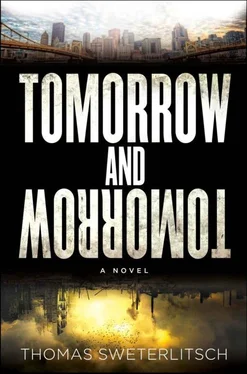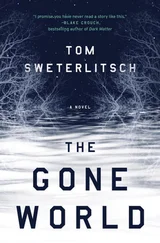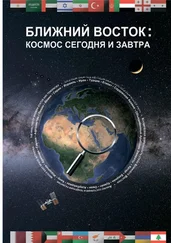The District of Columbia in late November—a golden afternoon, another round of sleet predicted for tonight. Sunlight dapples the Potomac, tourists swarm the National Mall. We share an outdoor table at the Café du Parc, at the Willard InterContinental. Everything’s burnished crimson and copper in the autumn light—stone surfaces of government buildings, cherry-red double-decker tour buses, what leaves remain in Pershing Park. Clusters of tourists chase guides waving neon pennants—desperate to see the White House through the wrought iron gates, the house set back on the chemically lush lawn, the alabaster columns and the world-famous gardens that obscure the views, the tropical fauna engineered to live even through winter, so flower-swollen it’s as if the air itself had ruptured into blossoms. They’ve come to imagine they’re closer to President Meecham here. They’ve come to imagine her life in those distant rooms—to maybe even catch a glimpse of her, or at least view the landscape she views as if the land itself is already a relic or somehow infused with her. Meecham shimmers through everything here—every tourist advert, every set of “White House China” sold from souvenir stands, every police shield, strip club pop-up, every fashionporn ad for DC couture—a mass hallucination, an ineffable vision, as if the northern lights had been captured bodily. “America’s Queen,” they call her, and they come to her like supplicants at Lourdes, carrying signs and posters depicting Meecham as the Virgin of the Seven Sorrows, seven knives piercing her porn-perfect breasts.
Waverly smokes. Blue eyes, disconcertingly blue—the color of Windex or antifreeze. A white sweep of hair. He’s like a publicity photo of a poet—stentorian, craggy and wrinkled, pausing in the conversation to savor his cigarette, or to gaze over the throng of tourists while he collects his thoughts. I’m bedraggled beside him in my hoodie and sweats. He’s wearing a suit, an Anderson & Sheppard that my Adware informs me is from Savile Row, London. Every other table is filled, I notice, except the ones contiguous to ours—like he’s arranged a buffer of empty plates around us, a bubble of relative quiet and privacy.
“New York,” says Waverly, when the conversation comes around to where he had been when Pittsburgh ceased to exist. “A fund-raiser at the Museum of Modern Art. You know, I swap stories with survivors all the time and love trumping them by saying I was staring at Guernica when it happened. I remember everyone in the gallery falling silent for a few moments—Pittsburgh must have sounded as distant to them as West Virginia or Alabama—until the notion hit that Manhattan might be the next to go. There was an unseemly panic—”
Adware overlays our table with adverts—Travelocity gnomes pitching Manhattan, Wheeling, Birmingham. Animated George Washingtons hawk cheap tickets to symphonies in the National Cathedral. I ignore them, try to concentrate on Waverly, but the George Washingtons morph into slutty Marthas in white wigs and low-cut gowns with powdered white breasts jiggling for my attention, seating charts nestled in their cleavage, buy, buy .
“I understand you work with an outfit called the Kucenic Group?” he says.
“I do. Or did—”
“Research, I take it? Insurance claims, that sort of thing? An impossible thicket of litigation—”
“Everything’s contested,” I tell him.
“You’d think it would be easier, having the City-Archive at your disposal—”
“It could be easier. Governments used to have the authority to issue mass death certificates,” I tell him, the patois of my job flowing mechanically, “but a case called State Farm v. the State of Pennsylvania changed all that. Since the Archive exists, the insurance companies argued they should be given the chance to verify every individual insurance claim, every property damage claim, everything. The checking takes years, slows down the payouts—”
“Are you good at your job?”
“I was dedicated, and interested—”
“You’re underselling yourself,” says Waverly. “I already know how good you are. I’ve talked with Mr. Kucenic and he tells me you were one of the best researchers he’s ever had, if not the best. Intuitive, efficient. He said your skills are far above your pay grade, but your personal difficulties hold you back from assuming greater responsibilities. He wonders if you have a fear of success—”
Waverly takes a drag on his cigarette and lets the smoke rise from his mouth. He’s reading something in his Adware while we talk—I watch his eyes twitch as they scan text. Why has this man bothered Kucenic? I don’t want him talking to Kucenic about me, I haven’t agreed to anything.
“Different priorities,” I tell him. “I don’t have a fear of success—”
“After talking with Kucenic, I realize your work must have been nerve shattering,” he says. “Watching people die, studying how they died, determining if their deaths are legitimate or somehow fraudulent, and all the paperwork. You must feel like you’re tracking ghosts sometimes—”
I’ve watched hundreds of people burn alive, but the woman buried in the river mud hangs over me like a burden of conscience. They haven’t left me—no one I’ve researched has ever left me.
“They are like ghosts,” I tell him.
“I want you to track a ghost for me,” says Waverly.
The usual nervous churning of butterflies when new opportunities present themselves—or at least distaste for stirring from my comfort zones. A fear of distraction from the things I care most about, maybe. I finish off my cappuccino. “You don’t need to waste your money on me, Mr. Waverly,” I tell him. “Accessing the Archive is free, if you sign up through the Library of Congress. There are plenty of actual librarians who are looking for research opportunities. Real professionals—”
“My daughter,” says Waverly.
A manila folder—an 8 × 10 of a woman that dissipates the Adware. Crimson hair the color of blood, languid eyes like emeralds. The photograph must have been for a fashion ad: the woman’s posed in a stylized hunch, her black gown exposing bone-white shoulders.
“This is your daughter?”
“I thought you’d be interested once you saw her picture,” he says. “Her name is Albion—it means the ‘white cliffs.’ Albion O’Hara Waverly. I’ve mourned her for ten years—just out of college when that picture was taken. Long after the end, I clung foolishly to the hope that she might have somehow escaped—but I’m sober now.”
“I’m sorry for your loss—”
Waverly dips a biscuit into his cappuccino. Illy pitches espresso in the Adware—I consent and soon our waiter brings a fresh cup and biscotti on Waverly’s tab.
“I schedule regular times to visit my memories of Kitty in the Archive,” he says. “Kitty was my wife of thirty-nine years. Katherine. There are certain memories I have—taking her to Mellon Park on Sundays for brunch, pastries and strawberries and champagne, and to the Frick in the afternoons for high tea. I commissioned designers to sculpt these moments so they would be more real for me than even my own memories of her. My daughter used to be there with us, but recently I haven’t been able to visit Albion—”
“You can’t bring yourself to it?”
“No, no, it’s not that,” he says. “She’s somehow vanishing from the City. Deleted. Someone’s deleting all her files—the public files and even my own private files. The job’s been thorough. The librarians—I’ve tried the librarians at the Library of Congress, and they’ve been sympathetic but haven’t been very helpful. They have too much work to do, building the City, maintaining it. I’ve filed police reports—but the police don’t have the resources. Besides, they don’t prioritize this as a missing persons case or anything of the sort but rather a data mismanagement claim or at worst cybervandalism or a hacking charge. Digital graffiti, that sort of thing, if they even want to entertain the notion that something like this is in their jurisdiction. I’ve searched on my own, but she’s vanishing. I have photographs—I know she exists. Existed—”
Читать дальше



![Том Светерлич - Завтра вновь и вновь [litres]](/books/401288/tom-sveterlich-zavtra-vnov-i-vnov-litres-thumb.webp)
![Том Светерлич - Исчезнувший мир [litres]](/books/420722/tom-sveterlich-ischeznuvshij-mir-litres-thumb.webp)







